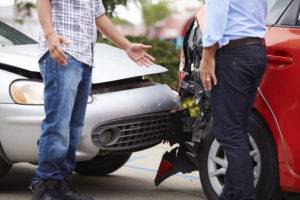Florida and a few other states follow the no-fault system for auto insurance. No-fault law means that each driver is responsible for paying for any damages they suffer in a car accident.
All drivers are required to carry personal injury protection (PIP) and property damage liability (PDL) in Florida. These types of coverage in an auto insurance policy allow drivers to pay for medical expenses, lost wages, property damage and funeral and burial expenses if necessary. Damages must be paid through PIP or PDL through one’s own insurance policy regardless of who’s at fault for a car accident. If someone is deemed responsible for a collision, they must pay for damages to the other party’s vehicle through their PDL coverage as well.
What it Means for Florida to Be a No-Fault State
Florida being a no-fault state means that everyone who drives is responsible for paying for their own damages if they’re in a road accident. It also means at-fault drivers must pay for damages caused to other parties involved in an accident.
Need free legal help in Florida?
We specialize in personal injury claims.

Legal Definition of a No-Fault State
The legal definition of a no-fault state is that anyone who has auto insurance is responsible for paying for medical expenses, lost wages and other damages related to a car accident. This means the insurance company reimburses them regardless of who is at fault.
Purpose of the No-Fault System
There are specific purposes for the no-fault system in Florida and other states that follow these laws. They include providing quicker access to medical treatment and compensation for accident victims and personal injury protection (PIP) coverage.
Providing Quicker Access to Medical Treatment and Compensation for Accident Victims
The no-fault system allows anyone injured in a car accident to more quickly receive access to medical treatment and compensation for their medical expenses and lost wages if they miss time from work. This is because their auto insurance policy more immediately pays them for out-of-pocket expenses and a portion of their income if injuries prevent them from working. By contrast, compensation from a lawsuit comes much slower.
Personal Injury Protection (PIP)
Personal injury protection (PIP) coverage is a mandatory part of auto insurance policies in Florida. It’s available with the no-fault system as a way for drivers and their passengers to be protected if they suffer injuries in a car accident. All drivers must carry at least $10,000 of PIP coverage before they can register their vehicle in the state.
Overview of PIP Coverage
Personal injury protection (PIP) coverage is mandatory under the no-fault laws. It includes a mandatory requirement for all Florida drivers to pay for medical expenses and death benefits.
Mandatory Requirement for All Florida Drivers
Florida drivers must carry PIP coverage in their auto insurance policies. The no-fault system is designed to provide up to 80% compensation of a policyholder’s medical expenses even if they are at fault for an accident. Injured passengers are also covered by PIP, which protects the policyholder from having to pay out of their own pocket.
Medical Expenses Covered By PIP
PIP covers 80% of medical expenses stemming from a car accident at up to $10,000 per person. It pays for medical necessities for covered persons, including doctor’s visits, dental work, hospital bills and ambulance rides. Injured parties must seek medical attention within 14 days of an accident to be covered by PIP.
Death Benefits Under PIP
PIP coverage also provides death benefits. If a policyholder is killed in a car accident, their insurance pays up to $5,000 toward funeral and burial expenses.
Need free legal help in Florida?
We specialize in personal injury claims.

Injury Threshold in Florida
Florida’s injury threshold is an exception to the no-fault law. It means that if a person suffers serious injuries in a car accident, they can file a lawsuit against the at-fault driver. This allows the victim to potentially recover compensation for their pain and suffering and other damages that fall outside the $10,000 PIP limit.
Examples of the injury threshold are permanent disability, permanent scarring or disfigurement and permanent injury.
Comparison to Fault-Based Systems in Other States
The Florida no-fault system requires all drivers to carry $10,000 in PIP and $10,000 in property damage liability (PDL) coverage as part of their auto insurance policy. By contrast, fault-based systems in other states mean that a driver who causes a car accident is directly responsible for compensating the other party or parties involved for their medical expenses and other damages. Instead of going through an auto insurance policy, the injured party or parties must file a lawsuit against the at-fault driver.
Frequently Asked Questions
Who Pays for Car Damage in a No-Fault State Florida?
In Florida and other no-fault states, a driver’s auto insurance policy pays for damages to their vehicle. This comes from property damage liability (PDL) coverage. However, if the cost of car damage exceeds the $10,000 PDL limit, the person can recover compensation through other means such as a lawsuit against the at-fault driver.
What Makes Florida a No-Fault State?
The requirement of using your own auto insurance policy and your PIP or PDL insurance to cover your medical expenses, lost wages and other damages is what makes Florida a no-fault state.
What Happens if You Are at Fault in a Car Accident in Florida?
If you cause a car accident in Florida, you must file a claim with your auto insurance to recover compensation. If you suffer a personal injury, PIP can pay for your medical expenses up to 80% and a portion of lost wages if your injury prevents you from working. PDL coverage pays for damages to the vehicle or vehicles involved in an accident.
What Does Florida’s No-Fault Law Mean for the Occupants of These Crashed Vehicles?
According to Florida Physical Medicine, if you’re in a car accident and occupants of your vehicle suffer injuries, you can file a claim with your insurance. However, you can also file a personal injury lawsuit if another driver is liable for the accident.
Do Insurance Rates Go Up After No-Fault Accident Florida?
Insurance companies are not allowed to increase your rate after a no-fault accident in Florida. However, your rate could increase if the accident is severe and you are deemed responsible.
Does a No-Fault Accident Go on Your Record in Florida?
In Florida, a no-fault accident will go on your record. This information can stay for three to five years or even up to 10 for a severe crash.
Is Florida No-Fault Auto Insurance?
Florida is one of the states that uses a no-fault system for car accidents. The law requires all drivers to carry $10,000 in PIP and PDL coverage to pay for damages related to an accident regardless of who is at fault.
Can I Lose My House Due to At-Fault Car Accident in Florida?
No, you cannot lose your house due to an at-fault car accident in Florida. This is because the state’s homestead exemption protects you.
Does Full Coverage Cover At-Fault Accidents in Florida?
Florida’s full coverage applies in car accidents regardless of who’s at fault. This includes comprehensive and collision coverage in addition to the mandatory PIP and PDL.
What Does Florida No-Fault Insurance Cover?
Florida’s no-fault insurance covers medical expenses, lost wages and death benefits with PIP and property damage with PDL coverage. Your insurance compensates you for these damages even if you’re at fault for an accident.
Who Pays for Damages in a Car Accident in Florida?
By law, auto insurance companies pay for damages resulting from car accidents in Florida. However, in cases where victims are severely injured or damages exceed what the insurance policy will pay, a person can file a lawsuit against the driver responsible for the accident.
Who Pays the Damages That Exceed the Policy Limits in Florida?
When the damages stemming from a car accident exceed policy limits, an injured person would have to file a personal injury lawsuit against the at-fault driver or another party.
Is Florida a No-Fault Car Insurance?
Florida offers all drivers no-fault car insurance and requires them to have the minimum coverage of PIP and PDL in their policies. Those coverage amounts are $10,000 for each.
What Does Florida No-Fault Insurance Cover?
Florida’s no-fault insurance covers medical expenses, lost wages and death benefits through PIP coverage and property damage through PDL coverage.
How Does Florida No-Fault Accident Work?
According to Liberty Mutual, Florida’s no-fault accident insurance works when a driver involved in a collision files a claim with their own insurance company. Even if a driver is at fault, they can recover compensation for their medical expenses through PIP coverage as long as they provide a recorded statement of the accident and seek medical attention to prove they suffered injuries. In some cases, the insurance company chooses the doctor the claimant sees.
Who Determines Fault in a Car Accident in Florida?
Florida is a no-fault state, so if a car accident occurs, the parties’ insurance companies determine who is at fault and whether they share some level of fault. This helps the insurers decide the appropriate compensation amount.
Who Pays for Car Damage in a No-Fault State?
In a no-fault state, each driver and their insurance company is responsible for paying for their own damages.
Florida No-Fault Who Pays for Car Damage?
In Florida, if a car accident causes car damage, the driver must go through their own insurance company to pay the damages. If their coverage isn’t enough, they can file a lawsuit against the driver responsible for the accident.
When Did Florida Become a No-Fault State?
According to the Florida Senate, Florida became a no-fault state on January 1, 1972.
No-Fault States
The no-fault states include Arkansas, Delaware, Florida, Hawaii, Kansas, Kentucky, Maryland, Massachusetts, Michigan, Minnesota, New Jersey, New York, North Dakota, Oregon, Pennsylvania, Texas, Utah and Washington.
Can You Sue in a No-Fault State?
You can sue in a no-fault state if you suffer serious injuries in an accident caused by another driver.
Can You Sue for Pain and Suffering in a No-Fault State?
You can only sue for pain and suffering in a no-fault state if you suffer an injury that causes permanent disability or disfigurement.
Need free legal help in Florida?
We specialize in personal injury claims.






